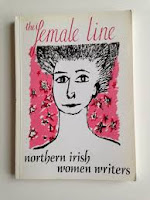1985
I’m
sixteen. I want to be a writer. I don’t tell people, in the confident way that
I used to when I was ten, because I know now that people like me don't become writers. It’s not exactly being a girl, or living in a council house; I blame Belfast. Ringed in steel, its grit and gloom are not, to
sixteen-year-old me, very sexy, and it’s a long time before they will
become the stuff of art. If you’re a Belfast writer, it seems you have to write
about The Troubles, and I don't want to. The Troubles are mostly, it seems to me, about men.
 |
| Not much cafe culture here |
I feel very disconnected.
I
pick up from the UK media that being Northern Irish (which some argue isn’t
even a viable identity) is regrettable. You can leave, of course. And I will. But not
yet. And, unlike many, I will come back.
In 1985 I
want to hang out in coffee bars and talk about Sylvia Plath and Katherine
Mansfield, but the town centre shuts at 5.30, and there isn’t any café culture. Nobody at the rugby club disco wants to talk about books. I am not a great hit with the boys. I meet
nicer boys at Drama in the Crescent Arts Centre, but they still don’t want to
talk about books.
 |
| Teenage me |
And
then The Female Line (ed. Ruth Hooley, now Carr) is published by the Northern Ireland Women's Rights Movement. I buy it in a bookshop that doesn’t exist any
more. (Eighties Belfast is bleak, but it is full of independent bookshops,
known then simply as ‘bookshops’.) It is an
anthology of writing by women from Northern Ireland – poetry, essays, stories.
Some of these women I have heard of, most I have not. I have never met any of
them; it will be many years before I think of writers as people you can meet in real life.
I
devour the book. Some of it is indeed about the Troubles, but by no means all.
It is about all sorts of things. It gives me hope. One day I
too could have my name in a book like this. And I can write about whatever I
like. It’s up to me.
 |
| The book that gave me hope. Then. |
2017
Well, I did it. My own seventh novel, Star By Star, my most overtly feminist novel, has just been published. I have long got over my reluctance to write about Northern Ireland. I have even delved into its murky history.
Tonight I’m
in the Crescent Arts Centre. No longer the cockroachy, falling-down raffish
place of the eighties, it is smart and refurbished and flourishing. It wears its architectural and social history proudly now -- for many years it was Victoria College, a pioneering girls' school and, as it happens, my own old school. It's easy, tonight, to think of all the girls who must have sat in this room, perhaps feeling as disconnected as I did at sixteen.
 |
| The Crescent Arts Centre, formerly Victoria College |
I’m in a
room full of women and men, but mostly women. We are celebrating the launch of
a new anthology, Female Lines, edited by Linda Anderson and Dawn Miranda Sherratt-Bado, described as 'both a new staging post and sequel to its vibrant feminist predecessor.'
I’ve
been asked to read from my story, ‘Let Me Be Part Of All This Joy.’ The title
is from a poem by Francis Ledwidge, but it strikes me as I take my position at
the lectern that I am indeed part of a Joy, the Joy of
writing, of being a woman in a community of women writers, of being in a city
that has recently been named one of the world’s top tourist destinations.
 |
| Reading Let Me Be Part Of All This Joy |
As someone who has mostly been published for young
people I am not infrequently excluded from the mainstream literary culture of
my home city, and sometimes the sixteen year old inside me wants to stamp her
Doc-Martened foot at this. But not tonight. Tonight I am part of the Joy, and part of the line.
I feel very connected.
 |
| The book that gives me hope. Now. |


5 comments:
Lovely, lovely, lovely. Thank you.
Just great! Thank you, Sheena, and good luck to the new book.
Brilliant! Good luck with it xxxx
Wonderful!
How inspiring - though I absolutely understand the Doc Marten impulse re mainstream vs. young people's literature. May the Joy last a long, long time.
Post a Comment